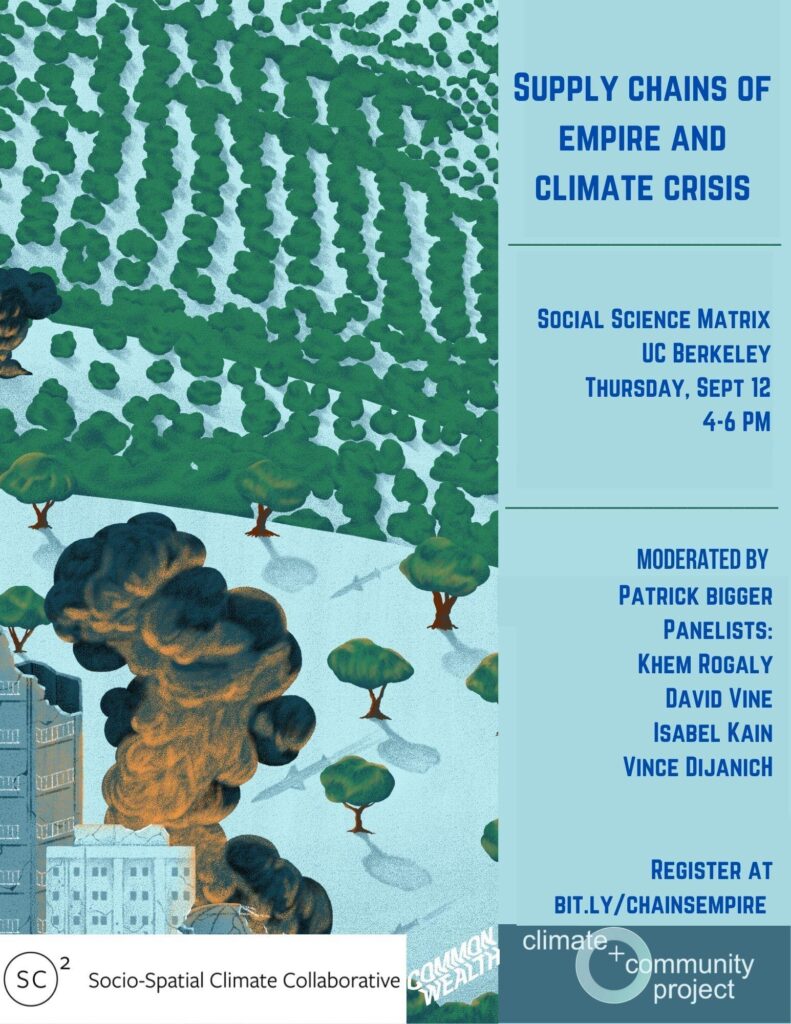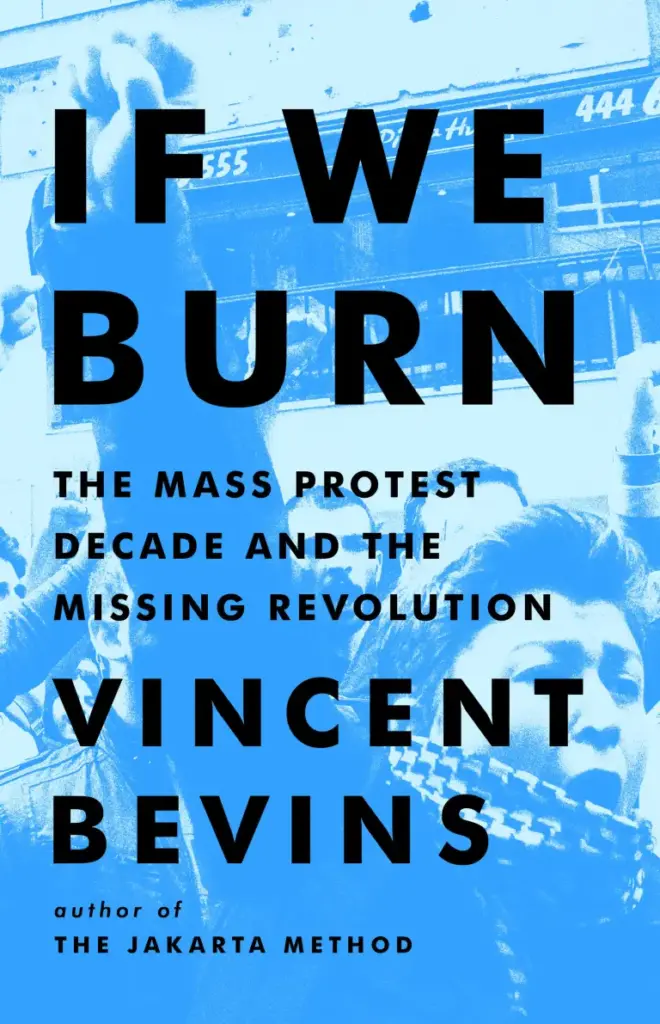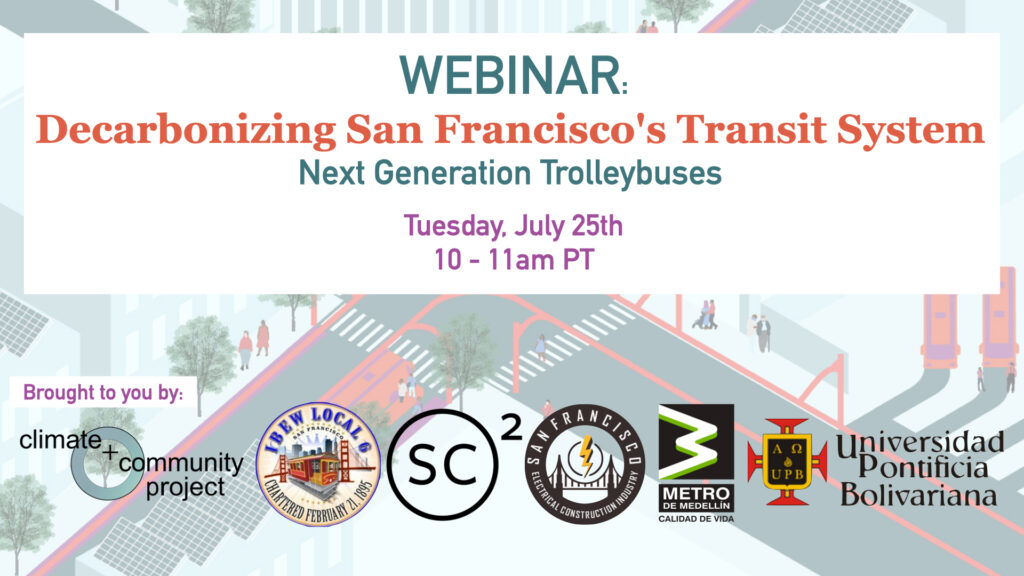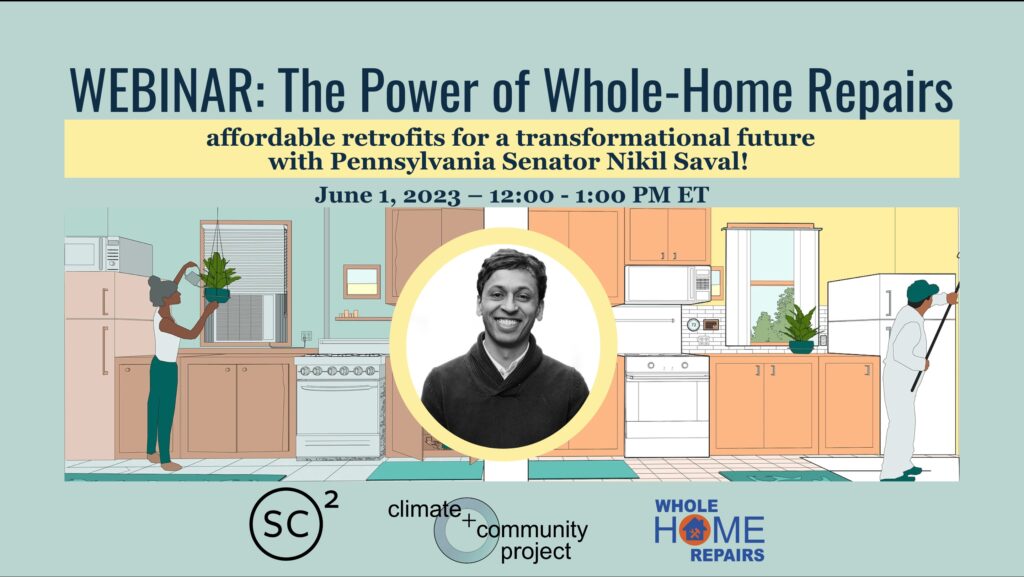ALL (SC)² EVENTS
UPCOMING

Supply Chains of Empire and Climate Crisis
Thursday, September 12, 2024 | 4:00pm – 6:00pm | 8th Floor, Social Science Building | RSVP here | Event page
Sponsors: Socio-Spatial Climate Collaborative, or (SC)2 and Climate and Community Project
The global military industrial complex is diffuse, as are its effects. From raw materials extraction to military manufacturing to military logistics to the ultimate deployment of weapons and personnel, the war machine captures vast material and financial resources, employs millions of workers directly and indirectly, and is having a catastrophic impact on the atmosphere and communities.
This panel will feature think tank, academic, and civil society experts to discuss critical issues and chokepoints in the sprawling apparatus of war that is destroying communities like Gaza in the here-and-now while producing existential ecological damage for vulnerable communities across the world – and organizing that is happening to contest militarism and climate chaos at critical chokepoints.
Panelists will identify and discuss key sites of inputs and outputs from the military industrial complex. And they will discuss organizing opportunities to reimagine and remake economies, from the imperative to destroy and subjugate toward production and distribution systems that promote genuine security through climate and economic justice.
Featuring
- Patrick Bigger, Climate and Community Project and (SC)2, Moderator
- Khem Rogaly, Common Wealth
- Isabel Kain, Researchers against War, University of California Santa Cruz
- Vince Dijanich, Veterans for Peace
- David Vine, American University, DismantletheMIC.org, American University, DismantletheMIC.org
PAST (2020-2023)

If We Burn: The Mass Protest Decade and the Missing Revolution
Tuesday, October 17, 2023 | 12:00pm – 1:30pm | 8th Floor, Social Science Building | Event Page | RSVP Required
Sponsors: Socio-Spatial Climate Collaborative, or (SC)2; Social Science Matrix
Vincent Bevins’ brilliant new book, If We Burn: The Mass Protest Decade and the Missing Revolution, tells the story of the recent uprisings that sought to change the world – and what comes next.
From 2010 to 2020, more people participated in protests than at any other point in human history. Yet we are not living in more just and democratic societies as a result. Over four years, the acclaimed journalist Bevins carried out hundreds of interviews around the world. The result is a stirring work of history built around one question: How did so many mass protests lead to the opposite of what they asked for?
Careful investigation reveals that conventional wisdom on revolutionary change has been gravely misguided. In this groundbreaking study of an extraordinary chain of events, protesters and major actors look back on successes and defeats, offering urgent lessons for the future.

Decarbonizing San Francisco’s Transit System – Next Generation Trolleybuses
Tuesday, July 25, 2023 | 10:00am – 11:00am Pacific | Virtual | Registration Link | Event Page
Hosts: UC Berkeley’s Socio-Spatial Collaborative, or (SC)2, and Climate and Community Project
Electrifying and expanding transit infrastructure will be crucial to meeting climate goals. In San Francisco, the city has operated electrified trolleybuses for over 85 years and this transit technology could be crucial to its decarbonization strategy. According to a new report, leveraging San Francisco’s existing trolleybus infrastructure and updating it with next-generation In-Motion Charging (IMC) technology is the cheaper, more resource-efficient, and faster way to electrify and decarbonize its fleet in comparison to battery electric buses. Join labor union representatives, researchers, and advocates as they explore how cutting-edge trolleybus technology could play a central role in San Francisco’s electrification goals, while providing stable service and good, union jobs. This study’s implications go far beyond San Francisco. Beginning in 2029 100% of new purchases by California’s transit agencies must be zero emissions with a goal for full transition by 2040, and cities across the world are considering employing next generation trolleybus systems in their own decarbonization plans.

The Power of Whole-Home Repairs: Affordable Retrofits for a Transformational Future with Pennsylvania State Senator Nikil Saval
Thursday, June 1, 2023 | 12:00pm – 1:00pm Eastern | Virtual | Event page
Hosts: PA Senator Nikil Saval, UC Berkeley’s Socio-Spatial Collaborative, or (SC)2, and Climate and Community Project
In July 2022, Pennsylvania signed the Whole-Home Repairs Program into law. Championed by state Senator Nikil Saval, Whole-Home Repairs is designed to improve housing livability and affordability and prepare state residents for a low-carbon future. The program funds three key interventions: grants for low- and moderate-income homeowners and forgivable loans for small landlords to undertake critical home repairs, accompanied by strong affordability requirements for renters; job training for good careers in home retrofitting; and county-level staff to help homeowners navigate the application and contracting process. Senator Saval’s WHR presents a novel solution to two major problems confronting existing home weatherization and retrofitting programs: delivering enough resources upfront to cover major repairs and providing grants that do not impose further financial pressures on cost-burdened households.
Join our conversation to hear about how groups won the bipartisan Whole Home Repairs Program in Pennsylvania, understand the benefits it brings to Pennsylvanians, and discuss how communities and policymakers can replicate the program in their state or community.
Fiscal Justice for Caribbean Climate Action: How financial extraction limits climate ambition in the polycrisis
March 20, 12:00-1:30 pm Pacific Time, 2023 | In person at Matrix Conference Room, SSB 820 | Featuring Dr. Patrick Bigger | Event page
Host: Socio-Spatial Climate Collaborative or (SC)2. Co-Sponsors: Climate Equity and Environmental Justice Roundtable; Climate Futures Lab; Climate and Community Project.
In the midst of the cascading series of emergencies that commentators have termed the polycrisis, two of the most serious, pressing, and apparently intractable components are the impacts of climate change on vulnerable communities and sovereign fiscal crises. Perhaps no world region illustrates the complicated interactions of these crises as clearly as the Caribbean. Damaging colonial legacies and ongoing political economic relations of fiscal extraction are inextricably linked to existential threats of intensifying storms, sea level rise, and loss of marine biodiversity. This talk will present quantitative data on how fiscal resources are extracted from Caribbean countries through predatory debt service and tax rules, and how those fiscal flows compare to the projected costs of climate action. We survey existing financial flows designated for climate action and evaluate them against alternative visions of how climate finance could be allocated. Using this comparison, our project assesses “PACC 2030,” the primary US policy framework regarding Caribbean climate action – which largely retreads the failed climate finance approaches of the last 15 years, as opposed to building a more reparative, ‘worldmaking’ mode of climate action. We will conclude with some reflections on the next phase of this project, in particular, engaging with Caribbean civil society to articulate a worldmaking approach to reparative climate finance.
CLIMATE JUSTICE AND THE QUESTION OF REPARATIONS
May 5, 12:00-1:30 pm Pacific Time, 2022 | In person at Brower Center Goldman Theater and virtual | Event page | UC Berkeley Climate Equity and Environmental Justice Roundtable, (SC)2
As the world burns, it’s time to get serious about climate justice. But the climate emergency isn’t just an environmental crisis—it’s also a crisis of racial capitalism and colonialism. The people and countries that have benefited the least from deforestation and fossil fuel combustion are the most vulnerable to climate change and its impacts. How can we address these harms, and prevent even worse? In his brilliant new book, Reconsidering Reparations, Olúfẹmi O. Táíwò makes the moral and political case for reparations for the harms of slavery and colonialism. Reparations, Táíwò argues, are equally essential to delivering climate justice. In this panel, Táíwò will summarize his case, and three distinguished panelists will respond, connecting Táíwò’s arguments to climate struggles across the Americas and beyond. Naomi Klein, the author This Changes Everything: Capitalism vs the Climate, will draw on her global political economy of the climate emergency. Sabrina Fernandes, a sociologist, author, climate organizer, and major public intellectual, will draw on her work linking climate and progressive politics in Brazil and beyond. And Jackie Fielder, a former California State Senate candidate, based in San Francisco, and an enrolled member of the Three Affiliated Tribes, will draw on her experience as a political organizer in California.
U.S. ENGAGEMENT WITH CHINESE CLIMATE POLITICS: PROGRESSIVE ALTERNATIVES TO COLD WAR POSTURING
MAY 19, 12:00-1:30 pm EDT, 2021| VIRTUAL EVENT | Event Page | Perry World House, (SC)2, McHarg Center, Population Studies Center
How should US-based Green New Dealers—and other advocates of ambitious climate policy—understand, respond to, and engage with climate politics in other parts of the world? That question is particularly fraught when it comes to Chinese climate politics, especially in the current moment, where a number of political elites in both of the United States’ leading political parties are casting China’s economic rise as a fundamental threat to U.S. interests. We worry especially about the prospect of a new Cold War. How can progressive forces in the U.S. counter the bellicose Cold War rhetoric and mobilization, without reflexively defending all that China does? After all, there is a lot to oppose. How can U.S. based climate movements push a more cooperative relationship with Chinese climate politics? What is the best way for U.S. progressives to push China to decarbonize more rapidly—at home, and in its world-spanning infrastructure projects? What would progress look like?
A PAN-AMERICAN GREEN NEW DEAL? GREEN INVESTMENT, EXTRACTION BATTLES, AND REFORESTATION
MAY 11, 12:00-1:30 pm EDT, 2021| VIRTUAL EVENT | Event Page | Perry World House, (SC)2, McHarg Center, Population Studies Center
Is there a possible Pan-American Green New Deal that centers workers and communities, while deconstructing centuries of American imperialism in the region? Any move toward continental climate justice will require policymakers, social movement, researchers, and others in the United States to face a Big Question: How should US-based Green New Dealers—and other advocates of ambitious climate justice action—understand, respond to, and engage with climate politics in other parts of the world? “A Pan-American Green New Deal? Green Investment, Extraction Battles, Reforestation” considers our Big Question in the broad context of climate politics in the Americas.Is there a possible Pan-American Green New Deal that centers workers and communities, while deconstructing centuries of American imperialism in the region? Any move toward continental climate justice will require policymakers, social movement, researchers, and others in the United States to face a Big Question: How should US-based Green New Dealers—and other advocates of ambitious climate justice action—understand, respond to, and engage with climate politics in other parts of the world? “A Pan-American Green New Deal? Green Investment, Extraction Battles, Reforestation” considers our Big Question in the broad context of climate politics in the Americas.
GLOBAL CLIMATE JUSTICE AGAINST NEO-COLONIALISM: NEW CONCEPTS AND PRIORITIES FOR JUST COOPERATION
MAY 3, 12:00-1:30 pm EDT, 2021| VIRTUAL EVENT | Event Page | Perry World House, (SC)2, McHarg Center, Population Studies Center
How should US-based Green New Dealers—and other advocates of ambitious climate policy—understand, respond to, and engage with climate politics in other parts of the world? This panel, “Global Climate Justice Against Neo-Colonialism: New Concepts and Priorities for Just Cooperation,” considers our Big Question in the broad context of climate politics across the regions of the planetary economy. The panel is also part of a broader series, called Democratizing Global Green Investment: Aligning Domestic and International Policies around Green New Deal Principles, which will also feature discussions focused on Latin American and Chinese climate politics.
GREEN SOCIAL HOUSING AT SCALE: LESSONS FROM VIENNA’S SOCIAL HOUSING ON PROJECT FINANCE, HOUSING IMMIGRANTS, AND CLIMATE-FRIENDLY URBANISM
APRIL 13, 12 pm, 2021| VIRTUAL EVENT | Event Page
Vienna has been building social housing for a hundred years. This housing is known for both its architectural innovation and quality, and for the financial sustainability of the model. Any discussion of building green social housing at scale in the United States must learn from the Vienna model. But to learn all the lessons from Vienna’s social housing model, we must dig beneath the surface to uncover what’s most promising—and what isn’t working. How does Vienna currently fund new social housing, and the maintenance of housing that already exists? How is it incorporating climate and sustainability issues into its projects? And how well is it doing in terms of housing immigrants and refugees, who suffer racism and processes of stigmatization in Austria? Read The Architect’s Newspaper‘s coverage of our green social housing events.
THE AMERICAN FUTURE OF GREEN SOCIAL HOUSING: LESSONS FROM THE BRONX’S VIA VERDE
MARCH 18, 2021| Co-Organized by Daniel Aldana Cohen and Karen Kubey | VIRTUAL EVENT | Full Event Details
The future of affordable housing must be climate-friendly, and it must provide a model for community living that’s splendid and racially just. How can the lessons of Via Verde, the lauded South Bronx housing development, help shape the future of green social housing in the United States? Via Verde, completed in 2012, was the result of New Housing New York, the city’s first design competition for sustainable below-market housing. Combining 222 affordable rental and home-ownership units, the award-winning project is a prototype for beautiful, green, healthy, anti-racist, and low-carbon housing. Sponsored by the Socio-Spatial Climate Collaborative, or (SC)2, and the Population Studies Center (UPenn); co-sponsored by the Pratt Institute School of Architecture Desegregation Think-Tank; supported by the Pratt Institute Academic Transdisciplinary Initiatives in the Office of the Provost. Read The Architect’s Newspaper‘s coverage of our green social housing events.
ECOSOCIALISMO: ENVISIONING LATIN AMERICA’S GREEN NEW DEAL
MARCH 4, 7-9 pm, 2021 | VIRTUAL EVENT | Full Event Details
A radical Green New Deal for the Americas calls for thinking beyond U.S. borders. This event brings together scholars and activists from across the Americas to dig into the underlying idea of a Green New Deal—injecting massive public investment into a rapid, democratic green transition—and to share lessons, insights, and proposals from their research and organizing experiences. Their conversation will tackle pressing questions around mobilizing investment in support of climate justice and the underlying principles of a Green New Deal.
LAND JUSTICE: BALTIMORE AND PHILADELPHIA
JAN 6, 2021 | VIRTUAL EVENT
Co-hosted by Philadelphia City Councilmember Kendra Brooks, Towson University, Philly Rent Control Coalition, and Legal Services of Philadelphia
Baltimore and Philadelphia can be thought of as sister cities in terms of racial and socio-economic demographics, housing stock, and regional characteristics. Long histories of residential and racial segregation have created inequities across race/class, access to land, education, and healthy food access. Both cities also have been hubs of Black power movements that envisioned autonomy and grassroots solutions to city-wide forms of apartheid. Philadelphia’s social movements are learning from Baltimore’s model of building green Community Land Trusts to provide healthy, permanently affordable housing while addressing the climate crisis. Social movements addressing issues of Black land reclamation and food sovereignty are exchanging ideas about political education across geographic space.
LATIN AMERICAN GREEN NEW DEAL
OCT 8, 2020 | VIRTUAL EVENT
A panel the political economy of energy and green investment in Latin America, featuring Camila Gramkow (ECLAC-Brazil), Tom Perreault (Maxwell School of Citizenship and Public Affaifrs, Syracuse Univ.), and Ruth Santiago (Attorney, Comite Dialogo Ambiental), moderated by Daniel Aldana Cohen (University of Pennsylvania) And The Riofrancos (Providence College). Sponsored by Latin American and Latinx Studies, Sociology, and (SC)² at the University of Pennsylvania.
BUILDING RACIAL JUSTICE THROUGH A GREEN NEW DEAL
SEPT 24, 2020 | VIRTUAL EVENT
In this panel, co-sponsored by Penn’s Socio-Spatial Climate Collaborative and McHarg Center for Urbanism and Ecology, we heard from Kaniela Ing, the lead organizer of the grassroots network People’s Action’s Green New Deal campaign; Olúfẹ́mi O. Táíwò, a philosopher who is reconceptualizing the links between demands for reparations and for climate justice; and, J. Mijin Cha, a legal scholar and labor activist who has worked on climate justice policy in New York and California. Nikil Saval, a Green New Deal advocate and the Democratic candidate for State Senate in Pennsylvania’s First District, moderated the discussion. Daniel Aldana Cohen introduced the panel.
LABOR, RACIAL JUSTICE, AND THE ROAD TO A GREEN NEW DEAL
AUG 10, 2020 | VIRTUAL EVENT
Shortly after the 2018 Midterm elections, the #GreenNewDeal burst onto the national scene and quickly garnered tremendous public and political support. But within months, the AFL-CIO weighed in with criticism of the process and its vision. Thus, the relation between environmentalists and labor unions was revealed in all its longstanding complexity. While the GND promises large employment gains in clean energy and a “just transition,” there is also real jeopardy to existing jobs in fossil fuel industries. More recently, protests against anti-Black racism and police violence have catalyzed resistance and transformed the climate justice movement. This session, with leading national scholar-activists, will explore these issues.
